51+ Sample Exit Interview Templates & Forms
-
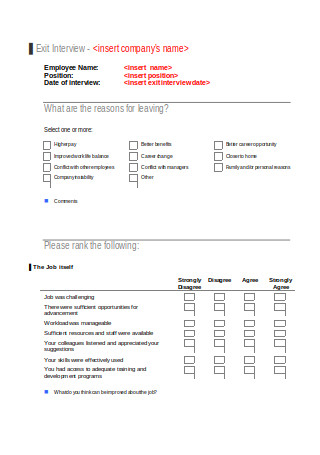
Exit Interview Template
-
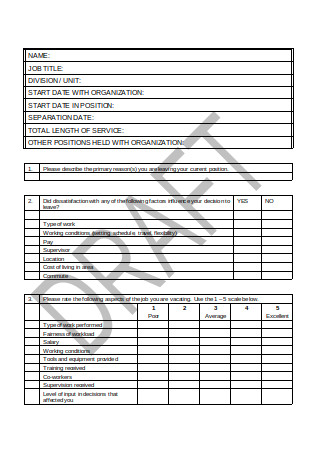
Sample Exit Interview Template
-
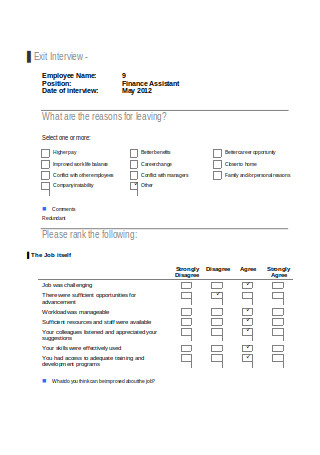
Simple Exit Interview Template
-
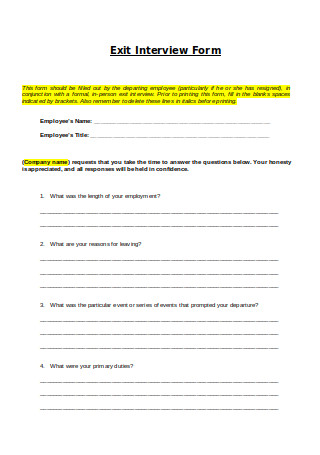
Exit Interview Form
-
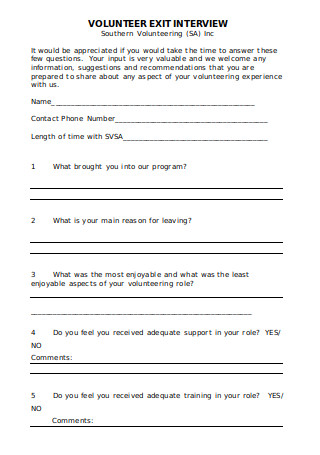
Volunteer Exit Interview Form
-
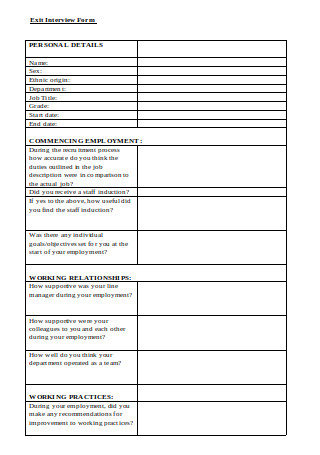
Sample Exit Interview Form
-
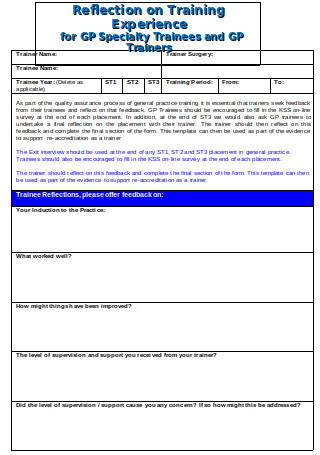
Trainee Exit Interview Form
-
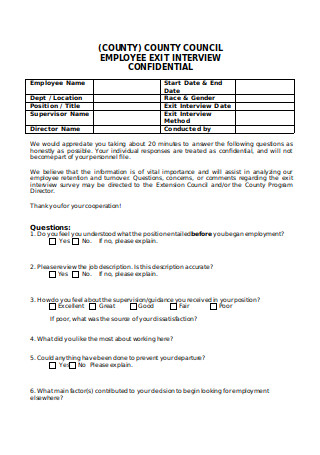
Employee Exit Interview Form
-
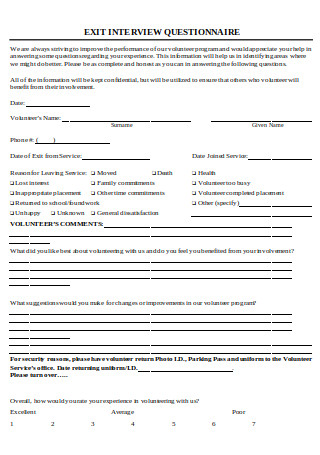
Exit Interview Questionnaire Form
-
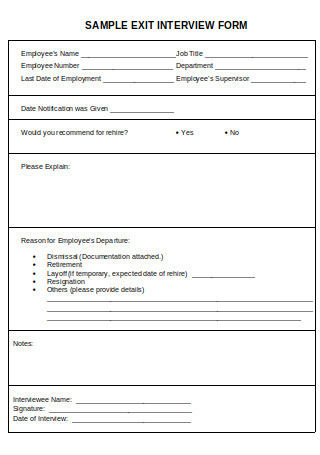
Sample Exit Interview Form in DOC
-
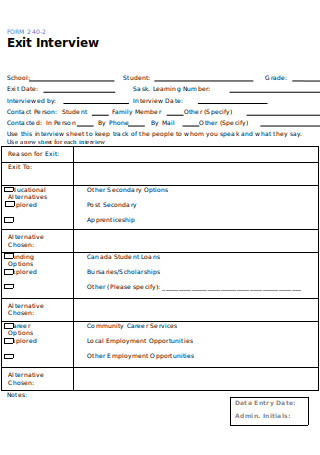
Effective Exit Interview Form
-
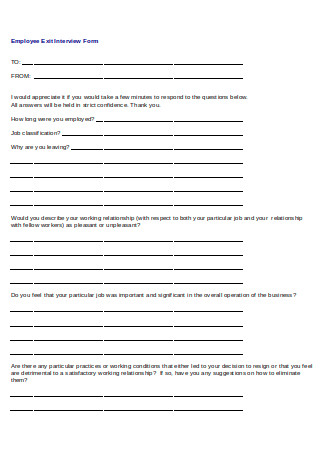
Simple Employee Exit Interview Form
-
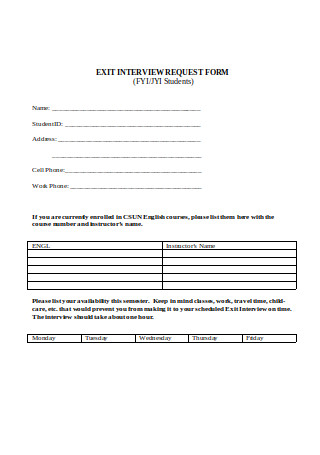
Exit Interview Request Form
-
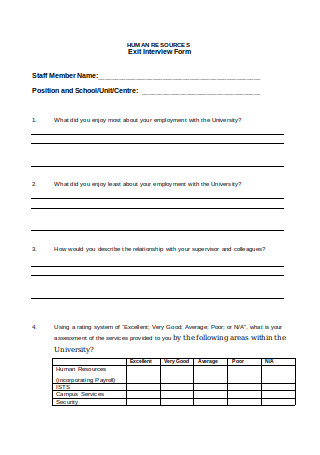
HR Exit Interview Form
-
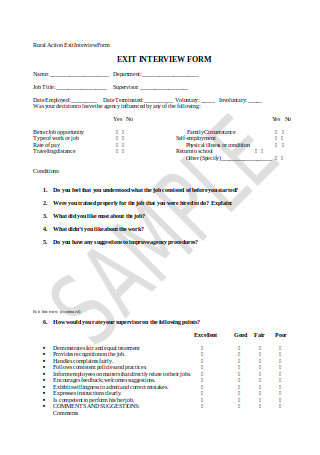
Rural Action Exit Interview Form
-
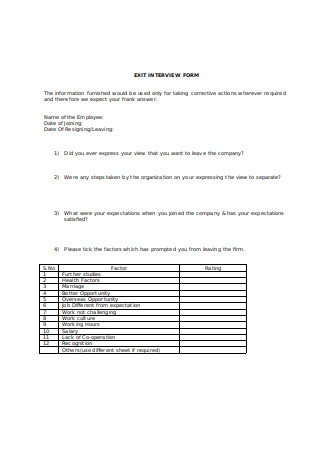
Formal Exit Interview Form in DOC
-
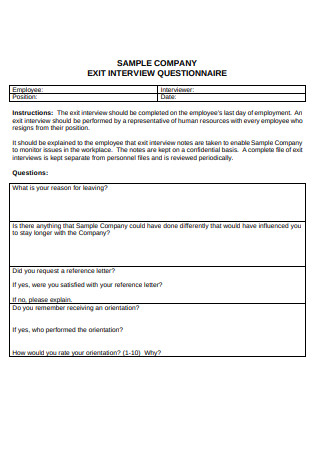
Sample Exit Interview Form Format
-
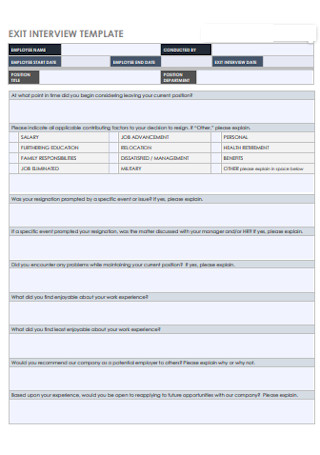
Format of Exit Interview Template
-
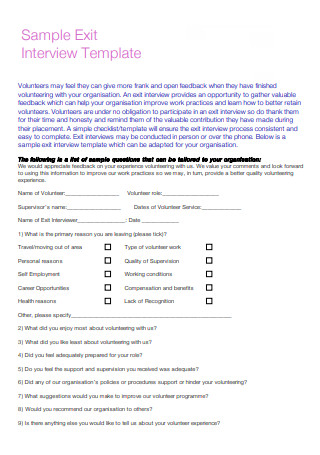
Sample Exit Interview Template
-

Exit Interview Policy Template
-
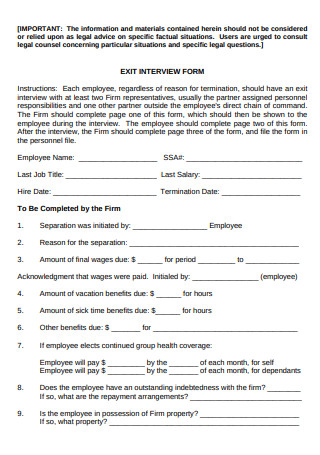
Exit Form Template
-
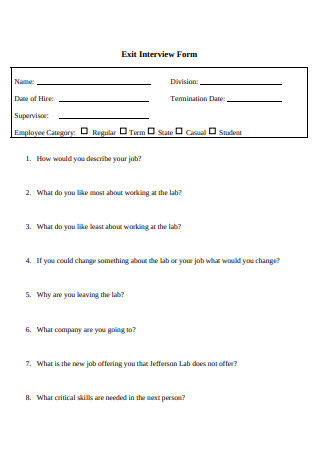
Exit Interview Form in PDF
-
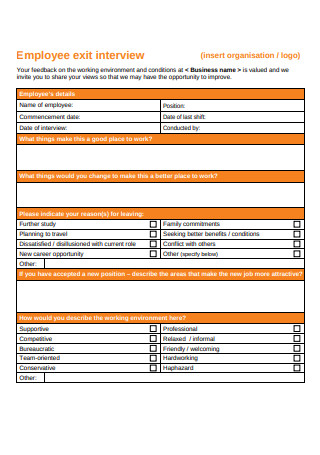
Employee Exit Interview
-
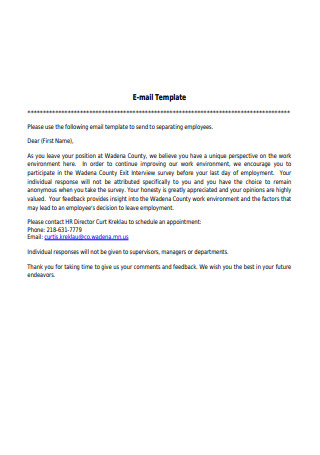
Exit-Interview E-mail Template
-
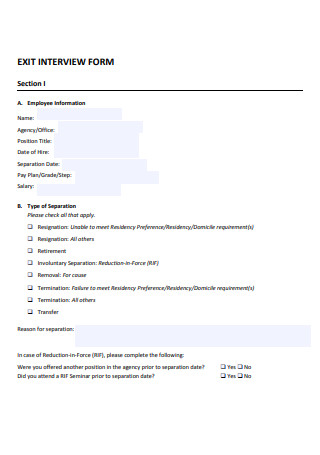
Standard Exit Interview Form
-
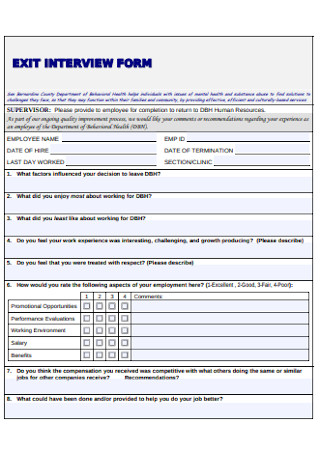
Basic Exit Interview Form
-
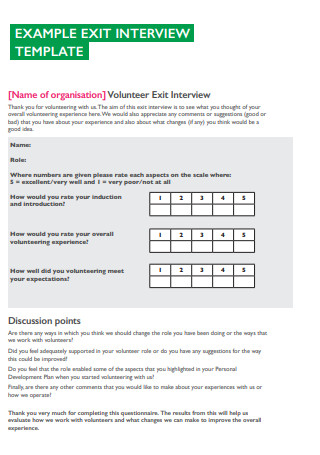
Example Exit Interview Template
-
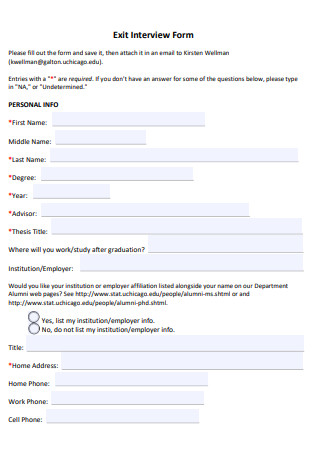
Basic Exit Interview Form Sample
-
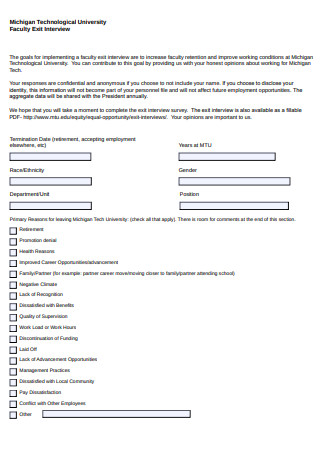
Faculty Exit Interview Template
-
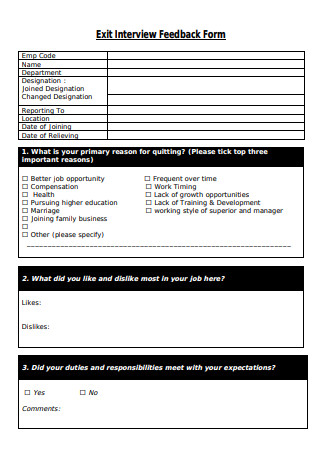
Exit Interview Feedback Form
-
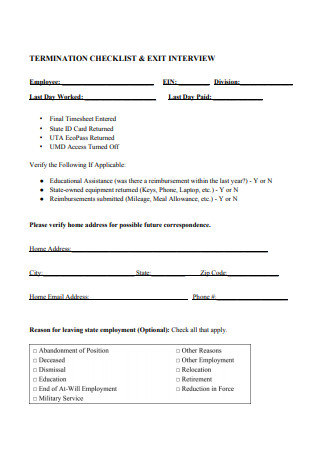
Termination Checklist & Exit Interview Form
-
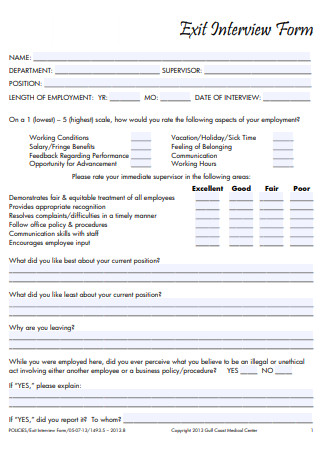
Professional Exit Interview Form
-

Sample Exit Interview
-
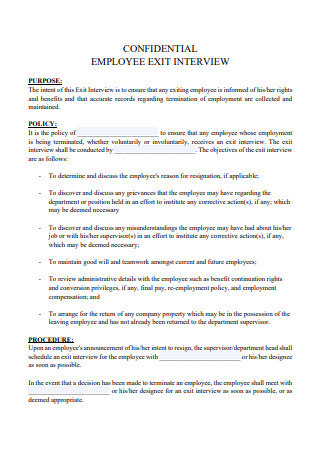
Confidential Employee Exit Interview
-
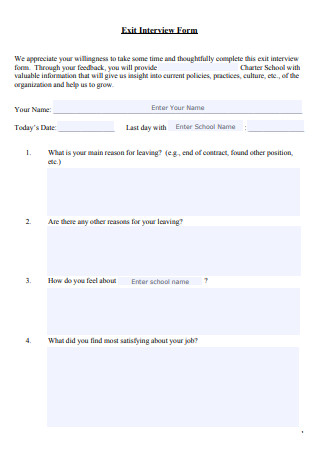
Printable Exit Interview Form
-
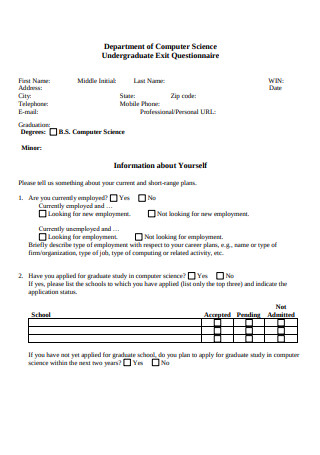
Undergraduate Exit Interview Form
-
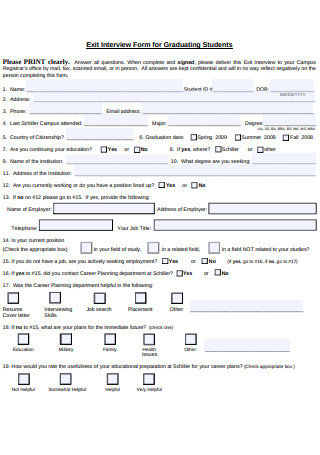
Exit Interview Form for Graduating Students
-
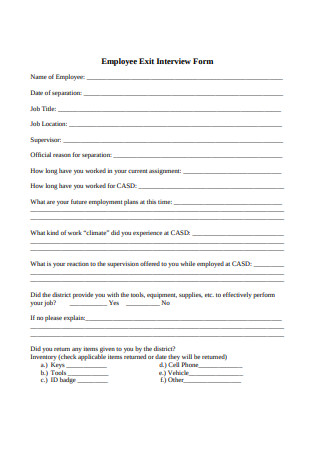
Sample Employee Exit Interview Form
-
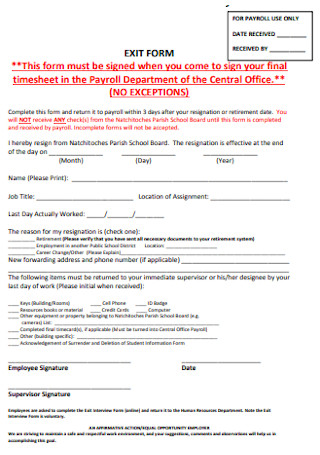
Exit Form Sample Template
-
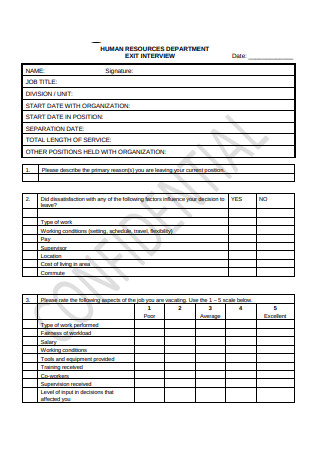
HR Department Exit Interview Template
-
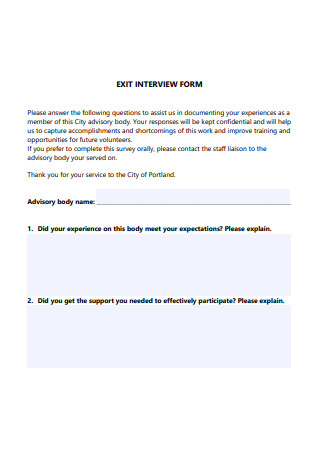
Formal Exit Interview Form Template
-
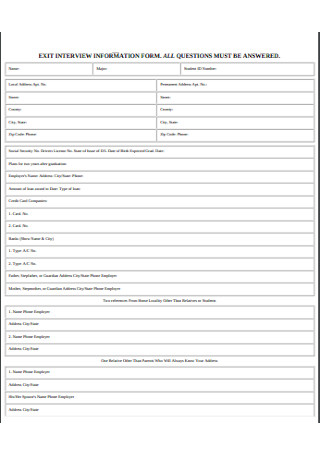
Exit Interview Information Form
-
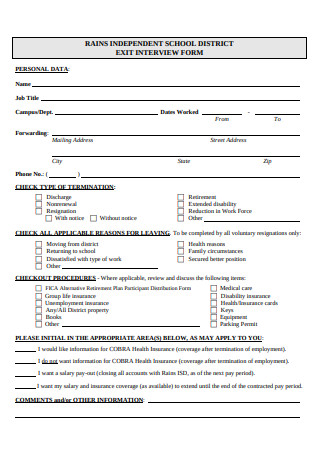
School Exit Interview Form
-

Format Exit Interview Template
-
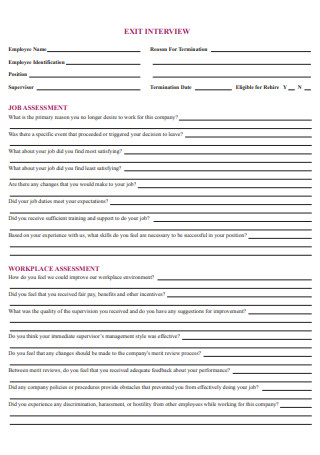
Standard Exit Interview Form Template
-
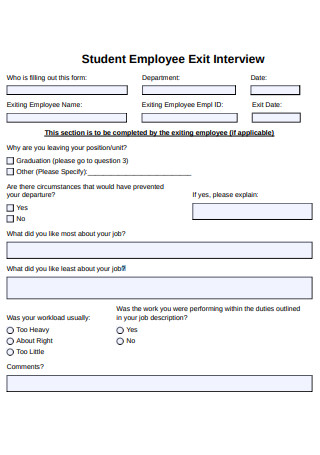
Student Employee Exit Interview Template
-
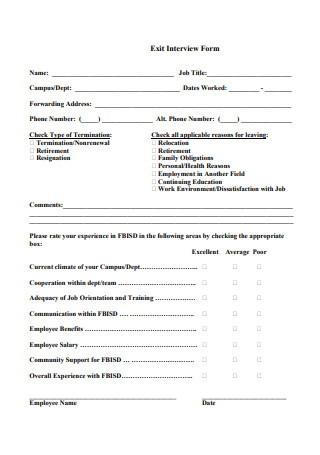
Professional Exit Interview Form
-
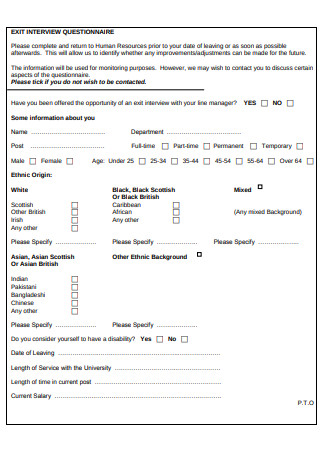
Exit Interview Questionnaire Template
-
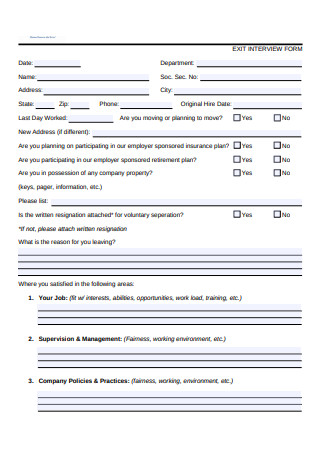
Exit Interview Form in PDF Format
-
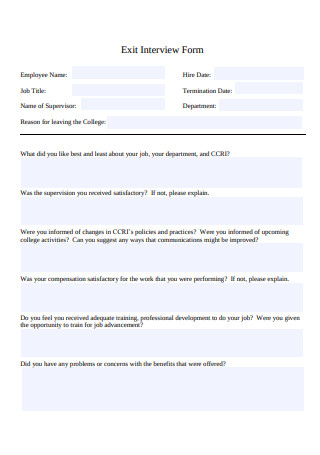
Simple Exit Interview Form Format
-
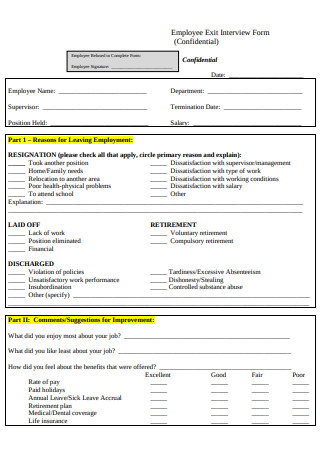
Basic Employee Exit Interview Form
-

Sample Exit Interview Template
download now
What Is an Exit Interview?
An exit interview is the last meeting that an employer may have with a departing employee. While the program is not mandatory by law, employees are encouraged to participate in the interview to help the company identify internal problem areas that need to be addressed. The survey is typically conducted using a form or template that employees can fill out with the necessary information. In most cases, the answers provided by the departing employee are discussed further during a sit-down meeting. Creating a systematized procedure to carry out the operation can be helpful in terms of gathering and interpreting data, as well as making it actionable to avoid high turnovers and to improve employee retention.
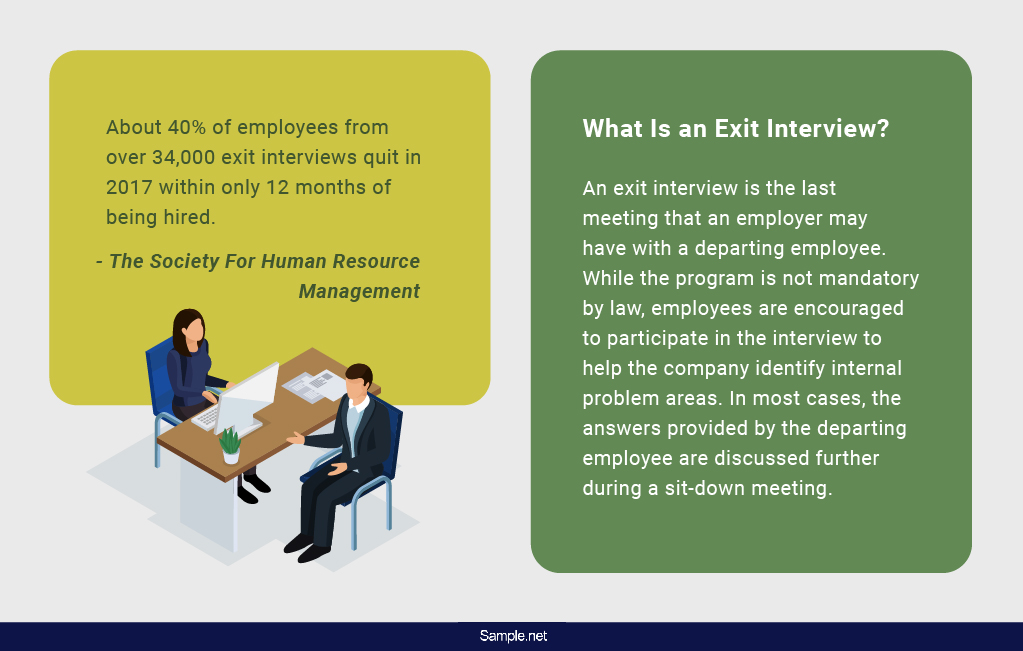
The Importance of an Exit Interview
There are no hard-and-fast rules when it comes to exit interviews. Among the 210 organizations surveyed for a study by the Harvard Business Review, only about 70.9% of them had their HR departments handle the exit interview for departing employees. The rest had the employees’ direct supervisors, managers, and external consultants do more of the work. It doesn’t matter who does the interview, as long as the interviewer is capable of collecting honest feedback and valuable information to help improve the company’s employee retention and motivation efforts. Obtaining constructive criticisms and personal insights from soon-to-be ex-employees can also offer you a brief look into what you’re doing right or wrong. Consider it as an opportunity to learn what your competitors are offering and what you can do to gain a competitive advantage.
In addition to enhancing the existing company culture, employers can use this feedback to rewrite or restructure the roles of future employees. This is done to stay in line with their expectations and ensure that employees are provided with enough attention to stay motivated. By performing the exit interview process consistently, you’ll begin to notice trends and behaviors that greatly influence a person’s decision to leave. This may be helpful in implementing change to avoid recurrent problems from surfacing along the way.
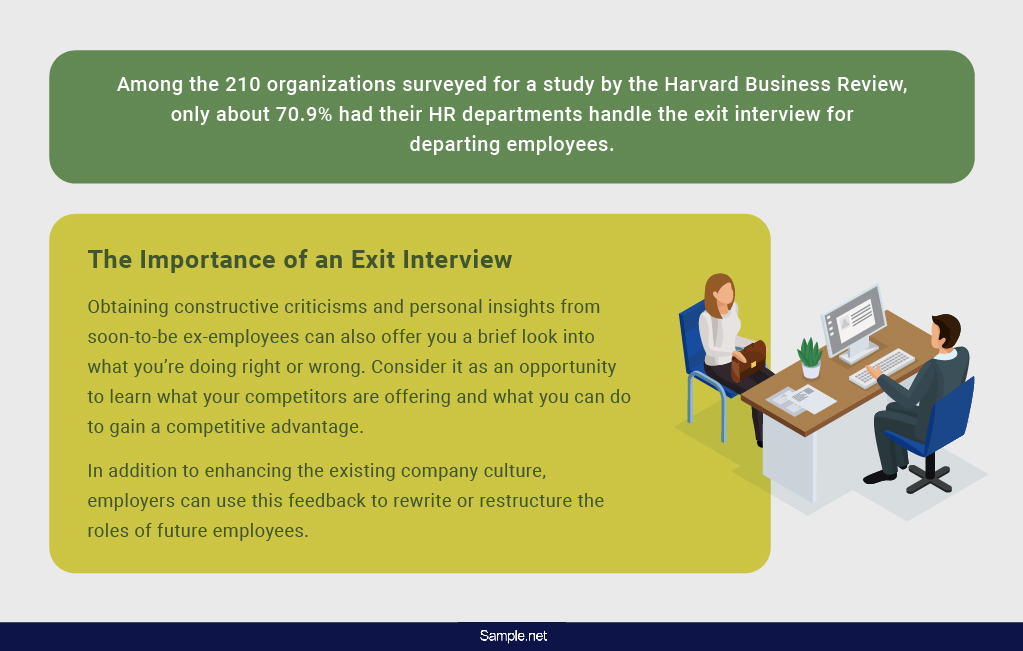
How to Conduct an Exit Interview
Employees that reach the end of their employment period, for whatever reason it may be, become the subject of an exit interview. Here, employers have the opportunity to ask questions regarding their reasons for leaving, along with the company’s current structure, workplace environment, and employee engagement efforts. The data acquired from the interview may be useful as the company moves forward with its operations.
But many times does the HR staff fail to take the proper approach to an employee’s departure. If both parties learn to focus on their shared goals, the exit interview can garner successful outcomes as employers and employees try to end their working relationship on a positive note. Listed below is a step-by-step guide to help you facilitate a productive discussion with an exiting employee.
Step 1: Choose an Interview Format
Providing the departing employee with a questionnaire to fill out is one way to avoid awkward discussions about one’s decision to move on from their current position. But even then, a face-to-face exit interview is still highly advised due to the benefits that it offers. For instance, dedicating your time to listen to what an employee has to say shows that you care about their opinions and feedback. It also helps end the relationship on good terms by ensuring that there are no hard feelings between the two parties.
While personal meetings are a better alternative, you can still opt to use the HR form to establish a standardized process for every employment ending procedure. You can use an exit interview form template to present departing employees with the same set of questions for an easier assessment.
Step 2: Appoint an Interviewer
If someone from the HR team is unavailable to conduct the interview, you’re free to assign someone else for the job. Be wary of the person you choose as it may affect how the exit interview goes. The person you’re likely to select might be someone familiar with the employee’s performance, such as a team leader, direct supervisor, or department manager. But if a person’s decision to leave revolves around the issues they have with their superiors, they’ll probably choose to steer clear of the topic to avoid burning bridges with the said individual. When this happens, it would be difficult for you to squeeze out the right data from the interviewee.
Step 3: Determine What to Ask
Always prepare your interview questions beforehand. Most exit interviews are scripted, with only a few unique questions that actually concern the employee’s particular case. Don’t waste any time asking safe questions to break the ice, as this will only leave you with broad answers and wasted minutes. Instead, be sure to prioritize the most critical issues that will help you determine what caused the employee to consider resigning from the position in the first place. While it’s true that better opportunities are waiting at every corner, an average employee won’t make that decision to leave unless there were other triggering factors that came to play. The interview may open doors to workplace revelations you never knew existed until now.
Confidentiality assurance is another matter to address to remind employees of their rights to maintain the anonymity of severe cases against other members of the organization.
Step 4: Decide What Questions to Avoid
There are a few questions you shouldn’t ask to avoid making an interviewee feel uneasy about answering. Counteroffers might be a part of your retention plan, but an exit interview isn’t the best time to propose your settlement. If you want the employee to reconsider their resignation, save your speech for a separate meeting. It’s essential to give a departing employee the chance to talk about matters from their perspective. If you want to gain honest inputs, learn to empathize with the individual. Stop focusing on the negative and try opening yourself to criticisms that may drive you to make positive changes in the current work environment.
Also, it’s never a good idea to push people to answer a question that they aren’t comfortable with. If the employee has terrible experiences and grievances to disclose during the interview, allow them to share these thoughts at their own will. The key is to avoid questions that target issues or individuals in the workforce who aren’t there to defend their character.
Step 5: Schedule the Interview
Plan your meeting with the departing employee a couple of days before the termination of their employment. Pick a time when the employee isn’t busy with the turnover process, as you’d want to handle the situation when the individual is at ease. Be sure to inform the employee about the exit interview through proper correspondence. This will give employees enough time to gather their thoughts and sort through their concerns for better delivery.
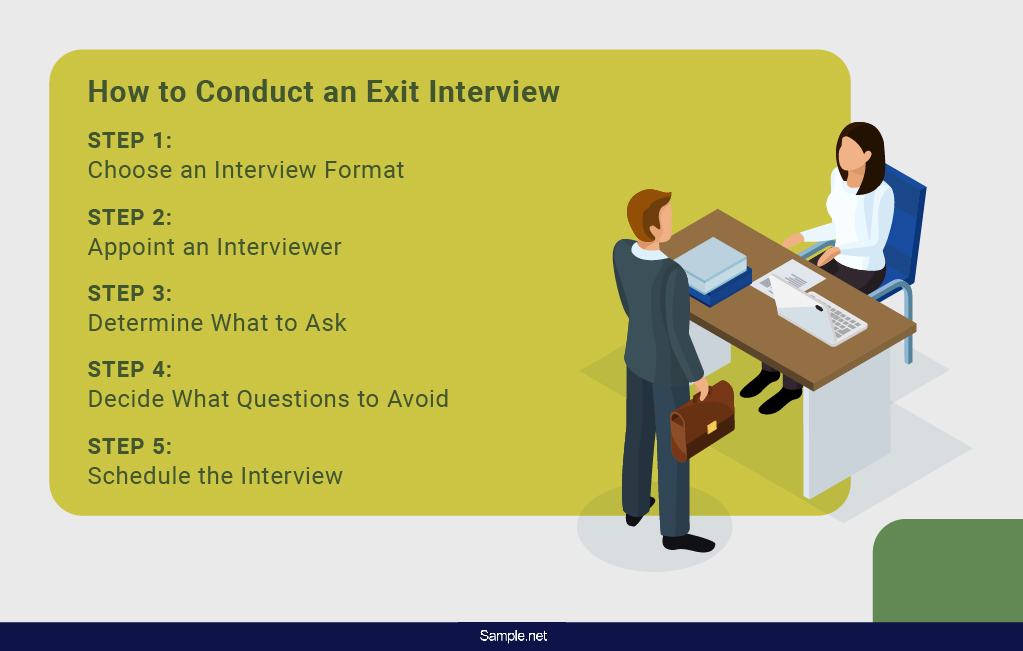
The Dos and Don’ts of an Exit Interview
Exit interviews continue to stir controversy across the HR and recruitment industry. The debate as to whether or not they are essential for refining the company’s working conditions and culture is not something that experts can conclude anytime soon. But from an external point of view, it’s clear that exit interviews are an important part of a company’s overall HR strategy and procedure. It’s not the most effortless process to administer, primarily if you aim to collect valuable feedback to address essential topics within the workforce. To ensure you make the most out of the interview, here are some reminders to remember by heart:
Dos
1. Do standardize your policy.
Organizations that conduct exit interviews have a better chance of gaining valuable information regarding one’s decision to leave the company. This is made known by the management by establishing the process in the company’s personnel policies. If departing employees are aware of this procedure, they can expect an exit interview at any time. This is an opportunity for the employee to think about any concerns or issues within the workplace that the management may address. Hearing the observations from someone who’s leaving is a bittersweet thing for HR managers to understand the factors that affect an employee’s daily work experiences.
2. Do ask open-ended questions.
Any effective interview would require you to ask the right questions. Your primary aim is to encourage the departing employee to open up to you and share honest insights for the answers you seek. You can ask questions about their experiences in the company, the things that they enjoyed, the matters that they like the least, and for any suggestions that the management could offer to keep valued employees. Open-ended questions are always better than simple yes/no questions because they allow interviewees to express themselves more explicitly. It’s also a chance for the interviewee to expound their thoughts more clearly for you to grasp.
3. Do listen to what the employee has to say.
Even if you have a ton of stuff to do that day and wish you could wrap things up as soon as possible, in an exit interview, it’s essential to really listen to what the interviewee has to say. For most employees, this is their only chance to speak out about their experiences without fear of getting treated differently after their confession. While you can’t expect someone to tell you every piece of information you want to hear, you can catch on on a few hints and implications that may be useful to your objective. This can often provide you with valuable insights into a prevalent problem within the company.
4. Do make it professional.
You might already know why an employee is leaving, and it may be tempting to just skip the interview to spare everyone from the hassle. But it’s the job of those in the HR department to take the time to sit down and discuss the issues in the workplace to help reduce employee turnovers. It can also be tempting to take things personally, especially when you’re running a small business with only a few members of your staff. Again, put your positive or negative relationship with the employee aside to approach the situation with a business-centered mindset. It’s time for you to focus on the loose ends or red flags that might have been missed during your time alongside the employee.
5. Do remind employees of their obligations.
It’s common for a company to require its employees to sign an employee non-compete agreement to protect trade secrets and other sensitive information from being shared with an unauthorized party. So when an employee decides to resign, an employer may see this as the last time to remind the employee of his or her obligations to maintain the confidentiality of company information. This is to comply with an ongoing agreement between the two parties that shall remain in effect until the specified end date.
Don’ts
1. Don’t be pushy.
You can tell when a person is being honest with you or when they have something to hide based on the way they deliver their thoughts. Some people could tell you great things about the company despite how their behavior says otherwise. The real reason for their departure could relate to low salary rates or horrible team managers, both of which departing employees would refuse to admit in front of an HR. Instead of forcing the information out from them, allow interviewees to open up to you about those problems. You can do so by asking them indirect questions that may lead them to the topic.
2. Don’t include third parties.
We tend to be more candid when we speak to someone that we know we can trust. If you want to gather a useful amount of information from a departing employee, leave third parties out of the exit interview. Including unnecessary individuals in the process will often hinder an employee from speaking up. The thought of having an extra pair of prying eyes (and ears) in the room can be discomforting for someone who’s about to reveal crucial details about company affairs. Instead, it’s a good idea to keep the interview exclusive to the concerned parties.
3. Don’t get defensive.
As previously mentioned, don’t take things by heart. Resist the urge to act defensively when criticisms are thrown your way. While they may not be the greatest nor the most productive employee in the workforce, that doesn’t give you a reason to forbid them from stating their own opinions. It’s important to keep the interview as civilized as possible to avoid heated arguments and a weakened relationship. It’s always best to answer questions calmly and to respond to comments professionally throughout the entire meeting. You don’t want to come across as too defensive, so be careful with your tone of voice and your choice of words.
4. Don’t forget to take down notes.
Note-taking is a good practice during exit interviews. It helps you recall the topics tackled throughout the exchange to review later on. It doesn’t matter if the interview runs for a mere fifteen minutes to an hour-long, as even the smallest bits of information could safeguard the company from legal disputes and other major affairs down the road. Think of it as meeting minutes that can help you recount the coverage of the discussion. It might be worth noting what was said by whom and in which order in case a record of your conversation may be used to resolve a problem in the future. Be sure to document only what’s necessary to save yourself from the burden of storing irrelevant data.
5. Don’t wait until the last minute.
Things often get more hectic nearing the end of one’s employment. If you don’t schedule the exit interview ahead of time, you may risk the opportunity of conducting a smooth and informative interview. You don’t want to get them at a time when they no longer have it in them to be open and honest with their feelings. It’s even worse when you’re forced to carry out the interview in a rush due to various time constraints. Timing is everything when you want to extract meaningful information for the benefit of your employee retention efforts.
The effectiveness of your exit interview program is best measured through the positive changes it generates for better employee satisfaction rates and lower employee turnovers. By taking the right approach to the situation, an exit interview can bring incredible value to the company’s future. It’s an essential step to understanding how you can improve your employee relations and workplace environment for all members of the organization.
